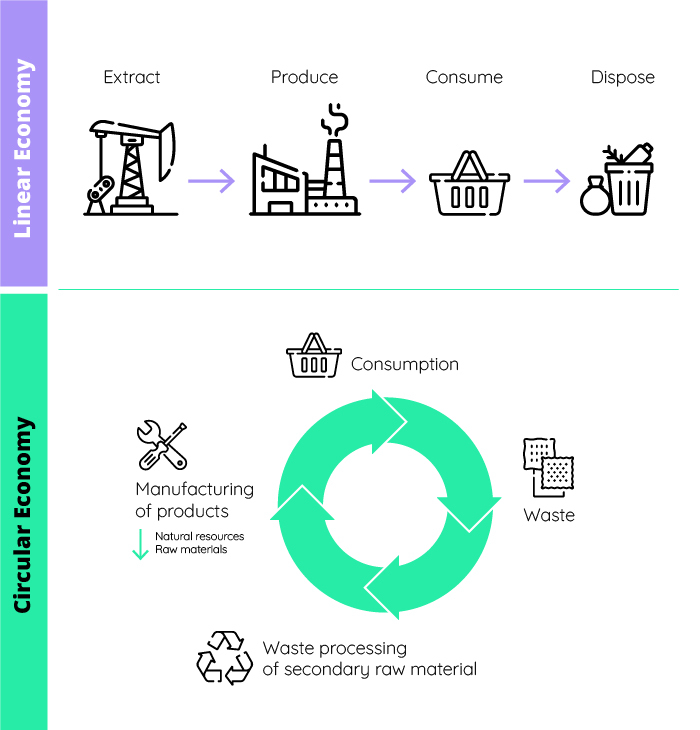Zero Waste Movement: understand the fundamentals of sustainability
The Zero Waste movement talks about waste and is part of global public interest themes in the environment.
The action aims to minimize human action’s consequences on ecosystems through practices that encourage sustainable natural cycles. Rethinking materials and processes, reducing the use of raw materials, and promoting policies that ensure waste disposal are among its flags.
Stay with us, learn all about the Zero Waste Movement and understand why the initiative drives the transition from a linear production model to a circular economy.
What is the Zero Waste movement?
The Zero Waste movement is an initiative in favor of a society with less waste and ultimately pursues environmental awareness through actions that encourage the construction of sustainable natural cycles.
Initially created in the 1970s and consolidated in the following years by the Zero Waste International Alliance (ZWIA), the project’s main theme is garbage and waste reduction. The goal is to prevent waste from ending up being incinerated or sent to landfills.
According to ZWIA, the concept aims to foster the circular economy, transform linear production lines into cycles, optimize the use of resources, reduce waste, and address recyclable and organic waste to the correct disposal sites.
The Rs of sustainability
The discussion around sustainability has taken shape over the years and entered the global agendas of organizations such as the United Nations and other global leaders.
It all started with three basic principles, which can be translated by the words reduce, recycle and reuse. These values became known as the 3Rs of sustainability and were fundamental in consolidating the environmental discussion.
With the advancement of the debate and the increasing importance of the theme, it became a consensus that only the recycling processes were not enough to slow the progress of consumption – and did not cover the whole framework of complex issues on the theme.
Today, experts and enthusiasts of the subject consider nothing less than 7Rs relevant to the debate, which collaborates to construct a circular economy and calls for reflection through individual attitudes of reuse and even non-consumption. Are they:
- Reduce
- Recycle
- Reuse
- Rethink
- Refuse
- Repair
- Reintegrate
Zero Waste: from invisibility to intentionality
Have you ever stopped to think about what happens to your trash after you throw it away?
The question could be rhetorical, but it has an answer: in most cities, the disposal destination is still the landfills, mainly in more remote (and needy) areas.
When we talk about “throwing something away,” we often do not stop to think that, from an environmental point of view, there is no “outside.” Everything is on the planet. The concept may seem somewhat philosophical at first, but it is easily corroborated by hard data.
For example, according to the Tides Foundation, a philanthropic entity linked to sustainability issues, about 95% of everything consumed in North America turns into garbage in up to 1 year.
Generally, this disposal flow is carried out “in automatic mode.” As a result of our daily routines’ frantic pace – or due to the lack of further reflection on the subject.
The problem is that this generates a phenomenon of “invisibility” about the waste treatment processes that we generate daily. Perhaps the thought is that there are people who know what to do with that. But the answers we have so far on how to transform this waste are not enough.
The formation of a cycle of production, consumption, disposal, and sustainable treatment needs to be more conscious and intentional. Thus, the motto of Waste Zero is to create awareness of everything we produce from garbage.
We need to deny the existing comfort of putting our garbage on the door and it just disappearing (just to put one more bag tomorrow and so on) to take an active role as influencers in this process to contain waste and degradation of the environment.
New production chains: the circular economy
Throughout the twentieth century, the economic model raised the standards of quality of life as part of the world population. But data points to a problem: population growth is running faster than the availability of resources.
Never before have so many people entered the consumer economy – by 2030, there will be more than 2.5 billion new consumers in the middle class. In the middle of 2050, the world population will consume at least three times more resources than today.
The problem is that managing a linear productive system when the resources available on the planet are finite is unsustainable. If the pace of consumption remains the same, the remaining resources on the earth will be insufficient to absorb this contingent.
In the past 30 years, we have consumed 33% of the planet’s natural resources. This demonstrates an inability to sustain this way of life. In this context, rethinking models is urgent.
The way out is to build a new productive structure that generates jobs and income through the creation of a circular value chain, in which everything that is extracted needs to go back into that circle in some way.

How to apply the zero trash philosophy
All spheres of society can adopt the zero-waste philosophy. In recent years, the coordinated effort between companies, public authorities, and citizens to discover creative alternatives to avoid waste, curb the depletion of non-renewable resources, and accelerate the recovery of ecosystems has increased.
The rise of digital has spurred a critical paradigm shift: the emergence of new business models based on access – not ownership. Models that use the processes of other industries to supply their own. It was a signal coming directly from companies about changes in this value chain logic.
And just as organizations must be accountable for the environmental impact of their actions, the first step in mass awareness of waste is the understanding that Zero Waste is also an individual movement. There must be awareness and intentionality about consumption.
Second, it is necessary to understand that the best way to dispose of your waste correctly is rethink the amount of waste you produce. At first glance, you will probably have a hard time understanding what is deprecable. Over time, you will see that everything we produce has the potential to go to waste.
Finally, choices must be made. We must be ready to prioritize consumption for what is really necessary. After all, even when we no longer want an object, it still needs to go somewhere.
Check out some attitudes that can help you in a gradual awareness of your waste production:
- Use eco-bags, cups, straws, and other reusable items
- Eliminate or minimize the use of disposable items as much as possible
- Perform maintenance and repair appliances and equipment
- Separate recyclable and organic materials
- Give preference to smaller packages – or glass
- Give priority to bulk purchases
- Buying from small producers
Zero Waste: the future knocks at the door
Society moves forward, and values change. Today, the way we face our responsibility for maintaining a sustainable relationship with the environment and the ecosystems surrounding us demonstrates an important awareness.
Despite the argument that the zero-waste philosophy is impossible to apply in the urban context, it has increasingly been a reality for many people and families worldwide.
And better: the movement is part of a new lifestyle, which includes other forms of non-waste, a “framework” that brings together doses of do-it-yourself, minimalism, cooperativism, and collaborative economics.
Discovering creative destinations for what was once discarded will be a strong trend in the next decade. Transformation is not simple, but it is necessary to guarantee the preservation of resources for the future.
The future knocks on the door. Accentuated climate change and the scarcity of natural resources herald the collapse of the current system – linear extraction, production, distribution, and consumption. It is necessary to rethink the entire value chain. That is why the Zero Waste movement calls for it. And you, what are you doing to avoid waste?

